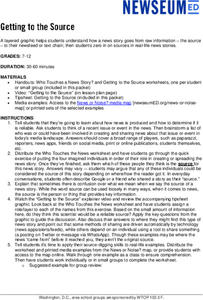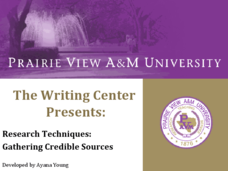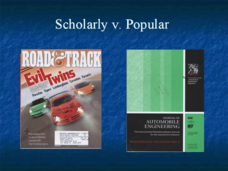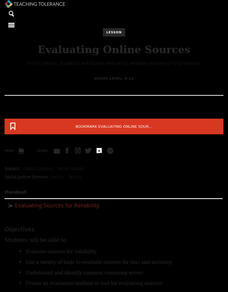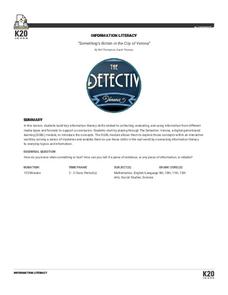Southern Poverty Law Center
Choosing Reliable Sources
It is more important than ever that 21st-century learners develop the skills they need to become savvy consumers of media. Young learners locate and identify reliable sources of information with a helpful media lesson.
Southern Poverty Law Center
Evaluating Reliable Sources
A lesson plan instills the importance of locating reliable sources. Scholars are challenged to locate digital sources, analyze their reliability, search for any bias, and identify frequently found problems that make a source unusable.
Curated OER
Analyzing Primary Sources
Analyzing primary and secondary sources is a necessary skill for students to attain, and can be learned through interesting activities.
Newseum
Getting to the Source
Reliable news stories are based on facts from reliable sources. Young journalists learn how to evaluate the reliability of news sources by watching a short explainer video. Teams apply their new source-digging skills to a current news...
Curated OER
Credible Sources on the Internet: What to Trust, What to Dismiss and When to Cite a Source
Wait, you mean researchers don't all use Wikipedia? Teach your class about intelligent research with a instructional activity about evaluating digital sources. The instructional activity starts with a quickwrite and includes vocabulary...
K20 LEARN
Street Cred: Evaluating Sources
A instructional activity on evaluating sources of information teaches scholars to "think twice" before using a source. Researchers examine a resource's home page, author, and sponsor, as well as the date published and the documentation...
Curated OER
Research Techniques: Gathering Credible Sources
How can you spot a credible source? What even makes a resource reliable in the first place? Answer some of these questions with this presentation. Although intended for higher education, this PowerPoint could be modified for middle...
Curated OER
Understanding and Using Primary and Secondary Sources in History
Explore primary and secondary sources in this historical analysis lesson. Young researchers define the terms primary source and secondary source. They read a primary source document provided by the teacher and answer questions about the...
Curated OER
Communities in Crisis Lesson 1: Primary Source? What is That?
Distinguish between primary and secondary source documents using the theme of philanthropy. Middle schoolers discuss Anne Frank: The Diary of Young Girl as a way to study the past using a primary source. Then they investigate how to...
Curated OER
Who is the Expert? Exploring Credible Sources in Healthcare
How do you decide what sources are credible when researching online? Evaluate sources with a focus on researching health issues. After brainstorming common health concerns and how they would try to diagnose these problems, class members...
Scholastic
Consider the Source
Who is more trustworthy when it comes to marijuana: a high school student, or The National Institute on Drug Abuse? Sources matter when reading informational text. Help teenagers discern which facts are true with an activity that focuses...
Calisphere
The 6 C's of Primary Source Analysis
Arm your class members with the six C's of primary source analysis—content, citation, context, connections, communication, and conclusions—and help them to establish a solid system for analyzing historical sources of information.
Southern Poverty Law Center
Evaluating Online Sources
All sources are pretty much the same, right? If this is how your class views the sources they use for writing or research projects, present them with a media literacy lesson on smart source evaluation. Groups examine several articles,...
Curated OER
Scholarly v. Popular (Journals)
How do you determine whether a resource is credible or not? Contrary to what your class probably believes, just because it's published doesn't mean it provides accurate information! So how does one determine if it's credible? Use this...
Curated OER
Thinking About Hate
This lesson starts out with a guided discussion about the statement "Birds fly in the sky; airplanes fly in the sky; therefore, airplanes are birds" and goes on to cover logical fallacies and reliable sources, relating these to the topic...
EngageNY
Gathering Information about Water Management: Assessing and Reading Internet Sources, Day 2
Accuracy, credibility, timeliness ... it's time to act on source reliability! Pupils continue conducting Internet research, selecting two questions about water management from their researcher's notebooks that they want to explore...
Curated OER
Digital Curation: Life and Times of Mark Twain
By digitally organizing research, your class leaves a legacy for future young scholars on the life and times of Mark Twain. Before reading The Adventures of Tom Sawyer, scholars conduct group research projects on one of six (listed)...
EngageNY
Using Search Terms for Further Research: Industrial Organic Food Chain
Class members conduct independent research to continue examining the consequences of the industrial organic food chain from Michael Pollan's The Omnivore's Dilemma. Pupils learn about source credibility and effective search terms, then...
Teaching Tolerance
Evaluating Online Sources
Newspapers, television, social media ... how do people get their news? Using the informative resource, scholars locate and verify credible sources of information. Working in small groups, they discuss strategies for evaluating the...
Texas Education Agency (TEA)
Drawing Conclusions Based on the Sufficiency and Strength of Research (English III Reading)
High school juniors learn how to construct a strong argument by crafting a claim and using neutral language backed by evidence from reliable sources. To do so, they learn to evaluate sources and evidence to support claims. They then...
Curated OER
The Real World Revisited
Class members participate in a series of hands on, online, and multimedia activities to identify the difference between primary and secondary sources. They watch a related video and visit a variety of sites to locate primary and...
Curated OER
CCC: Credible sources, Creative Commons Images, and Citing Your Sources
As part of a unit devoted to the study of autobiographies, this one-day library session focuses on developing research skills. Class members locate and properly cite a sketch of a Creative Commons image, as well as record the call...
Curated OER
Taming the Wild Wiki
Take a look at the credibility of online sources such as Wikipedia. Discussion points and handouts are included to facilitate a meaningful and informative dialogue. Tips are given on how to determine if a Wikipedia article is reliable...
K20 LEARN
Something's Rotten In The City Of Verona: Information Literacy
Data is a powerful tool that your class can use for both good and evil! Help your classes become knowledgeable consumers of information through a game-based exploration. Learners examine a method of determining the reliability of a...





